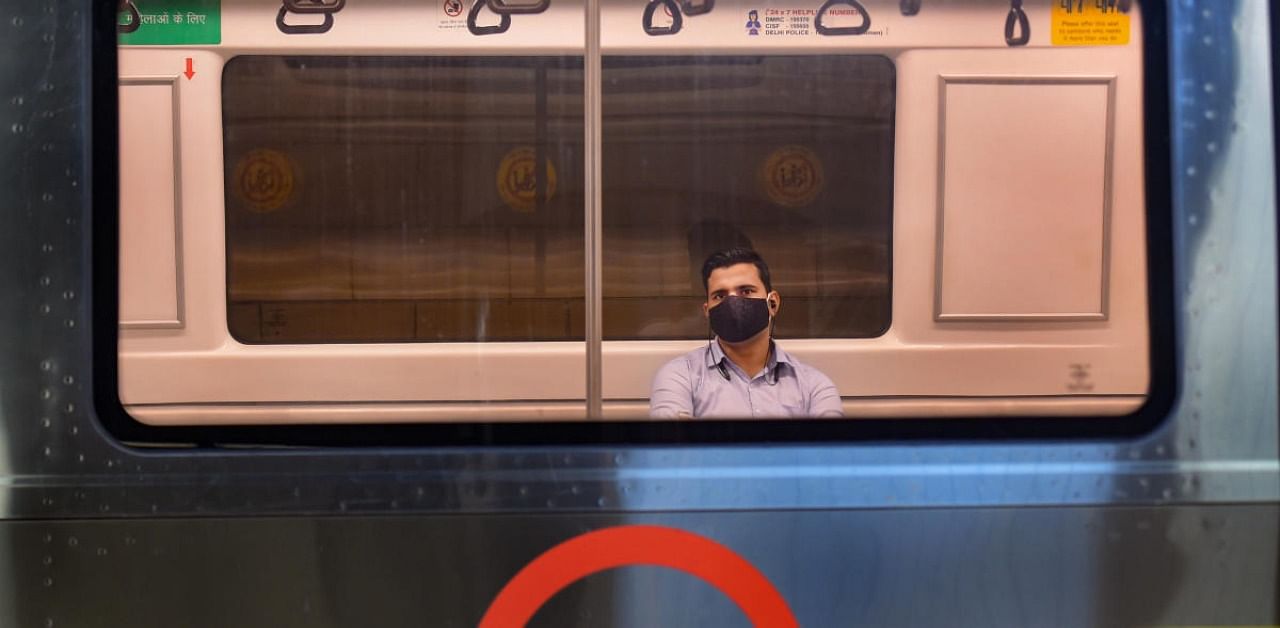
As Delhi Metro resumed operations on Monday after a very long hiatus due to Covid-19, a very small number of commuters chose to avail the facility while mentally juggling concerns over health and urgency to reach work.
On day one, mostly office-goers boarded the sanitised train coaches of the rapid transit system. The trains will operate in batches of four-hour each from 7-11 am in the morning and 4-8 pm in the evening.
The Delhi Metro was closed on March 22 to contain the spread of the coronavirus, and after 169 days, it resumed services in a curtailed manner while adhering to strict safety and social distancing norms.
At Rajiv Chowk metro station, the busiest station of the network which serves as an interchange facility between the Yellow Line and the Blue Line, an unusually thin crowd was witnessed.
Earlier, it mostly used to be packed with people jostling for space and vying to enter or exit train coaches.
Sumitra Devi (45), a government employee, who works at Connaught Place adjoining the Rajiv Chowk metro station, said ever since the lockdown was lifted, she faced a lot of difficulties commuting to work and had to take buses which were rare to get.
A resident of Maidan Garhi, she said she often had to wait for hours to board a bus due to restrictions over the number of passengers in a vehicle.
With metro services resuming, she said she can now save time and reach her workplace faster without any hassles.
Asked how safe her ride was, Devi said it was "definitely different but safe".
"Of course, I was quite sceptical but then if not today, we will have to eventually take metro rides. How long can we avoid it? I hardly saw less than 10 passengers in my compartment but it was smooth," she added.
After being closed for over five months due to the pandemic, Delhi Metro resumed services with curtailed operations on the Yellow Line, even as both the Delhi Metro Rail Corporation (DMRC) and the commuters trod with caution amid the new normal in the rapid transport system.
As the day began, some riders wearing protective masks were seen entering the premises of key stations like Kashmere Gate, Central Secretariat, Hauz Khas on the Yellow Line which connects Samyapur Badli in Delhi to Huda City Centre in Gurgaon.
Inside the stations, passengers were allowed entry to the concourse only after checking body temperatures with thermal guns and sanitisation of hands.
Also, inside coaches, commuters sat on alternate seats and maintain prescribed distance even while standing.
Hundreds of Delhi Metro ground staff and security personnel of the CISF wore face shields, masks and gloves to ward off any risk of the infection.
Guarav Chautala (25), a resident of Janpath, who works at a service store of a mobile giant in Gurgaon, said he was a "little apprehensive" to take a metro ride.
"But, I didn't have any other option," he said.
Asked how he was managing the commute before this, Chautala said, "My brother who works at Naraina used to pick me up and drop me off on his bike to my workplace. It was very tiring. Plus, we had to start from home very early. I'm glad proper arrangements have been made by the metro authorities."
Under stage one of the graded plan of the DMRC, Yellow Line or Line 2 and Rapid Metro were made operational on Monday with restricted service hours, a senior official of DMRC said.
Shivam Mittal (23), who works for an IT company, said he came to Kashmere Gate metro station in an e-rickshaw from his home in Gandhi Nagar in east Delhi.
"Today is the first day of the metro resuming services. Earlier, I was going to office with my friend. My office is in Malviya Nagar. I am a bit scared, but have no other option," he said while entering the premises of the massive terminal.
Only one entry gate was opened at the Kashmere Gate metro station, which is situated next to the city's ISBT.
All precautions were taken by the officials and staff. At the entry gate, they were sanitising belongings, including bags, a passenger said.
Rohit Tomar (30), an advocate, said he has to go to Saket regularly to attend meetings.
"I have to meet my client in Saket. The only reason I am taking the metro is the traffic issue. I took an auto-rickshaw till Kashmere Gate metro station from my house in Shahdara in east Delhi. I thought that being a Monday, there would be a heavy traffic on the roads. The DMRC has said they have taken all the major precautions, so I am taking the metro," he said.
Gunjan Sharma, a resident of GTB Nagar who is employed with an NGO, also travelled by the metro in the morning. She was taking the bus until now.
With the metro services resuming, the commute to work has become a smooth ride, she said.
"We hardly had five passengers in my compartment and there was enough space to maintain social distancing since there were hardly any people. It felt unusual but I am happy that things DMRC resumed train services a day after the city recorded 3,256 fresh Covid-19 cases, the highest single-day spike here in 72 days, as the infection tally mounted to over 1.91 lakh.
The number of fresh cases and active cases of Covid-19 have risen in the city in the last several days.